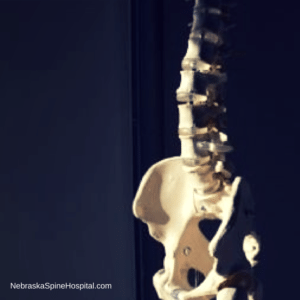The terms ‘herniated disc’ and ‘bulging disc’ are sometimes used interchangeably, but they are actually two different conditions. A herniated disc happens when there is a crack on the outer layer of the disc. A bulging disc occurs when the nucleus or center of the disc squeezes into the cracks of the discs outer covering. This weakens and stretches the disc’s covering. According to WebMD, “As a disc bulges out from between the neighboring bones (vertebrae), it can press on nerves that travel to the legs or arms and can cause numbness, weakness, or pain.”
actually two different conditions. A herniated disc happens when there is a crack on the outer layer of the disc. A bulging disc occurs when the nucleus or center of the disc squeezes into the cracks of the discs outer covering. This weakens and stretches the disc’s covering. According to WebMD, “As a disc bulges out from between the neighboring bones (vertebrae), it can press on nerves that travel to the legs or arms and can cause numbness, weakness, or pain.”
There are a number of causes to a bulging disc, but the most normal cause is simply aging. As humans age and their bones degenerate, the discs that hold the spinal vertebrae together are more likely to bulge. However, there are a few other situations that can cause a disc to bulge. If a person works a job that requires lots of lifting, bending, and movement of the spine, a disc would be more likely to bulge. Also, anyone who has been in a severe car accident, or suffers from a sport injury could have a bulging disc. Heavy smokers are more likely to experience a bulging disc, since cigarette smoke degenerates the bones faster than normal. And finally, if a person has a family history of disc diseases, they are more likely to experience a bulging disc than someone who doesn’t.
The best way to properly diagnose the bulging disc is to consult with a doctor about the symptoms, and then to have a MRI scan or X-ray to take a look at the affected spine. There are several ways to treat a bulging disc. Pain medication and physical therapy are the most common treatments. In some rare cases, surgery is needed. If surgery is the answer, the doctor will likely perform a laminotomy and discectomy. Basically, the doctor will remove the bulging disc, which decompresses the spine.
Sources:
http://www.allaboutbackandneckpain.com/understandingconditions/bulgingdisc.asp
http://www.webmd.com/hw-popup/bulging-discs
